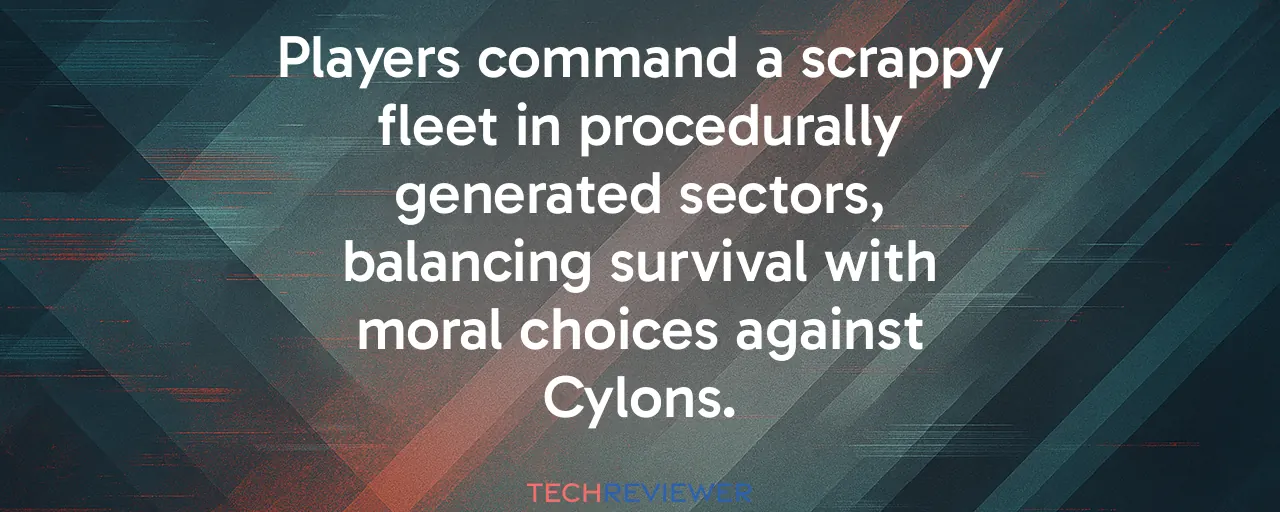A New Spin on a Beloved Universe
When Battlestar Galactica: Scattered Hope debuted at Gamescom 2025, it caught everyone's attention. The game shifts perspective from the iconic Galactica crew, placing players in command of a scrappy junker fleet, dodging Cylons and scraping by in hostile space. This fresh perspective, crafted by French studio Alt Shift, shows how a classic sci-fi IP can thrive in a genre known for punishing mechanics and endless replayability.
The game leans hard into tactical roguelike roots, blending real-time fleet battles with pausable strategy and faster-than-light jumps between procedurally generated sectors. It feels like FTL: Faster Than Light meets Crying Suns, but with the weight of Battlestar's lore. Early previews describe 30-minute runs filled with tense decisions, like sacrificing fuel for an emergency jump or assigning a VIP to boost your fleet's morale.
Why Old IPs Shine in New Genres
Reviving a franchise like Battlestar Galactica through a roguelike lens is no small feat. Alt Shift, known for Crying Suns, builds on its experience to deliver a game that feels both familiar and wildly inventive. The modular event system ensures every run tells a unique story, weaving canonical lore into randomized encounters without forcing a linear path. Players negotiate with factions like the Military or Underworld, where choices ripple across sectors, adding depth to the survival stakes.
This approach taps into a broader trend. Classic sci-fi IPs, once tied to blockbuster budgets, are finding new life in indie and AA studios. Scattered Hope joins games like Marvel's Midnight Suns, which paired superhero lore with tactical deck-building. Both titles prove that niche genres can amplify beloved universes, offering depth that resonates with dedicated fans while inviting newcomers to the fold.
Case Studies: Scattered Hope vs. Midnight Suns
Comparing Scattered Hope to Marvel's Midnight Suns reveals how licensed games balance innovation with fidelity. Scattered Hope thrives on its procedural sectors and dynamic Cylon AI, which escalates threats as you progress. Its strength lies in making players feel like desperate survivors, facing choices that echo the show's moral ambiguity. For example, previews highlighted moments where players sacrificed civilian ships to outrun Cylon flagships, sparking debates about ethics in crisis.
Marvel's Midnight Suns, developed by Firaxis, took a different tack, blending turn-based combat with relationship-building among heroes. Its deck-building mechanics felt fresh for Marvel fans, but some criticized its slower pace compared to Firaxis's XCOM series. Scattered Hope avoids this by keeping runs tight and tense, though its complex UI could overwhelm newcomers. Licensed games benefit from streamlining depth to engage casual players while satisfying diehards.
Challenges in Blending Lore and Mechanics
Not every player will jump aboard Scattered Hope's junker fleet. Roguelikes demand patience, and the game's real-time tactics might intimidate those used to simpler controls. Alt Shift faces the challenge of balancing accessibility with the depth that roguelike fans crave. Early demos showed a dense UI, which previewers flagged as needing polish before launch. If the team nails this, they could set a standard for future sci-fi roguelikes.
Then there's the question of staying true to Battlestar Galactica. The IP's fans expect lore that respects the source, but randomized runs risk diluting iconic story beats. Alt Shift's solution, a narrative engine that surfaces canonical events dynamically, seems promising. Still, the team aims to ensure these moments land with weight, appealing to both longtime fans and newcomers who just enjoy outsmarting Cylons.
What This Means for Sci-Fi Gaming
The rise of Scattered Hope points to an exciting shift. Indie studios like Alt Shift and publishers like Dotemu are proving that classic IPs don't need AAA budgets to shine. By focusing on replayable mechanics and deep strategy, they're carving out a niche that sidesteps live-service fatigue. Games like this could pave the way for other sci-fi revivals, imagine a Firefly roguelike or a Babylon 5 tactics game.
For players, the payoff is clear: fresh ways to explore beloved universes. Scattered Hope delivers agency, letting you write your own story as a scrappy fleet commander. Its blend of moral choices, tactical combat, and procedural storytelling feels like the start of something bigger. If Dotemu and Alt Shift keep listening to community feedback, this could be the spark that lights up sci-fi gaming for years to come.
